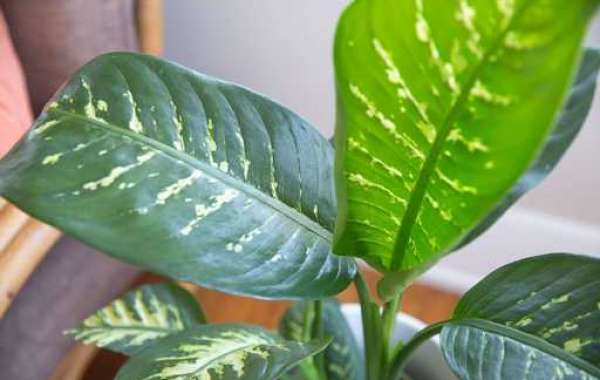In the colourful realm of houseplants, one species stands out for its striking appearance and intriguing name – the Dumb Cane. Dieffenbachia's scientific name doesn't reveal much, but the moniker "Dumb Cane" sparks curiosity. These popular indoor plants boast distinctive foliage, making them a cherished choice for homes and offices. In this article, we explore the world of Dumb Canes, delving into their characteristics, varieties, and the unique traits that make them a favourite among plant enthusiasts.
The Name and Its Story
The name "Dumb Cane" may raise eyebrows, but it has an interesting origin. Dumb Canes are part of the Araceae family, which also includes the Peace Lily and Philodendron. These plants contain oxalate crystals that can cause a temporary loss of speech and numbness if chewed. As a result, they were humorously called "Dumb Canes" due to this potential effect.
However, it's essential to note that these effects are not serious and only occur if the plant is ingested, so there's no reason to be alarmed by the name. These plants have protective adaptations in their natural habitat, including bitter taste and irritants, which deter animals from eating them.
Characteristics of Dumb Canes
Dumb Canes are known for their distinctive features that make them stand out in the world of houseplants:
Leaves: Their leaves are large, often ovate or lance-shaped, and come in various shades of green with stunning patterns of white or cream. The leaf patterns can vary from species to species, creating a range of visual appeal.
Growth: These plants can grow to be quite tall, making them excellent choices for adding height to indoor gardens. They usually reach heights of 3 to 6 feet, depending on the variety.
Air-Purifying: Dumb Canes are renowned for their air-purifying qualities. They can help improve indoor air quality by filtering out common pollutants.
Low Maintenance: They are relatively low-maintenance plants, making them suitable for both novice and experienced plant enthusiasts.
Tropical Origin: Dumb Canes are native to Central and South America tropical regions. Their natural habitat provides insight into their care requirements.
Varieties of Dumb Canes
The Dumb Cane family includes various species and cultivars, each with its unique features. Some of the popular ones include:
Dieffenbachia seguine: Known for its striking dark green leaves with creamy-white patterns, this species is a classic choice for indoor decoration.
Dieffenbachia maculata: Recognizable by its elliptical, dark green leaves adorned with specks and splotches of white or cream.
Dieffenbachia Camille: This cultivar is cherished for its compact growth and lovely cream and green variegated leaves.
Dieffenbachia Tropic Snow: A charming variety of bright green leaves speckled with white creates a captivating snow-like effect.
Dieffenbachia Exotica: A larger variety with a commanding presence, boasting broad, rich green leaves and creamy-white streaks.
Dieffenbachia Compacta: True to its name, this compact variety is perfect for smaller spaces, with its attractive variegated leaves.
Unique Traits
Apart from their striking foliage, Dumb Canes exhibit unique traits that add to their charm:
Tropical Allure: The lush, tropical appearance of Dumb Canes can instantly transport you to exotic destinations and infuse your space with a touch of the tropics.
Varied Leaf Patterns: The endless variety of leaf patterns and colours allows you to choose a Dumb Cane that perfectly complements your interior decor.
Air Purification: Dumb Canes have the ability to cleanse the air of common household toxins, contributing to a healthier indoor environment.
Adaptability: They adapt well to a range of indoor conditions, including lower light levels, making them ideal for offices and homes with less natural light.
Low Allergenicity: Dumb Canes are considered to have low allergenicity, meaning they are less likely to trigger allergies in people.
Visit The Jungle Collective, a site for the purchase of all types of plants, indoor plant pots, etc.
Conclusion
These plants add a touch of the tropics to your living space and contribute to better air quality. With their low maintenance and adaptability, Dumb Canes have earned their place as beloved houseplants for novice and experienced plant enthusiasts.







